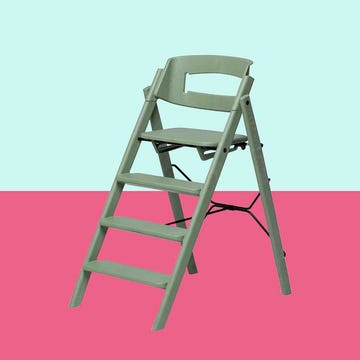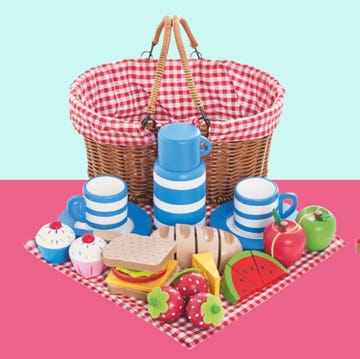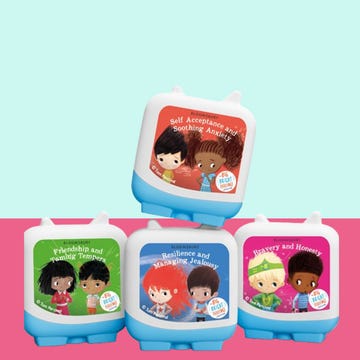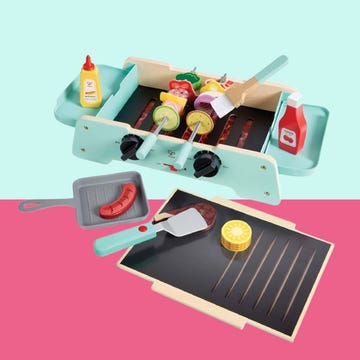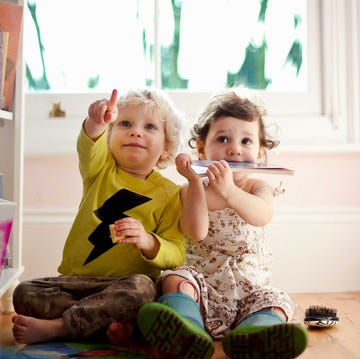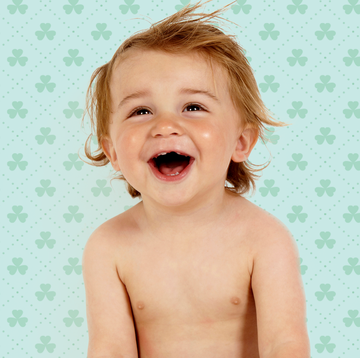Pauline died in November 2019, aged 45. She asked her friends and family to make sure that this feature was published. Money is being raised in her memory and a fund has been set up by her family on here.
Being a parent with cancer and having children of school age at the same time really is challenging. It’s relatively unusual, although we’re here if you look for us. We're in every school playground.
Generally, people who have cancer are older, the stats say over 50, the waiting room at the oncology clinic says to me over 60. Either way, folk are invariably there with a grown-up daughter or son, or partner of 50 years - someone close, who has time to help to process what’s going on and remember what was said.
The 30-50 year olds like us, with our aggressive, fast-growing cancers in what were our healthy active bodies, go with partners (if we can both get time off work), or friends if kids are all at school, with parents (not always ideal), or better, just on our own. Then we can be candid with the doctor and nurse about side effects and have honest, difficult conversations.
A summary of our blood results (‘platelets are a little low but they’re not too concerned at the moment’) and the next plan of action is what we share on our WhatsApp. Oh, and a cute photo of our child covered in cupcake icing at Harry’s house while we were at the hospital of course! That’s what’s important. Taking care of other people always first. I’m not being glib here, it’s true. We have to look after others before ourselves. That’s what we all do as parents.
I have metastatic breast cancer in my liver and bones. It responds to treatment and then starts growing again. It’s aggressive and relentless. It’s a terrible worry. I live with my eight-year-old son Frank. We have a close and incredibly supportive network of family, friends and neighbours which has our backs and provides us with the help we need when we need it. But a lot of the time, it’s just us. It’s DVT and BFG. It’s me, lying on the sofa after dinner with swollen feet from a deep vein thrombosis (caused by sticky blood, caused by chemo), while Frank reads a few pages of Roald Dahl for his reading record. It’s then the internal battle of fatigue versus bath and bedtime which has to be negotiated. When folk say you’re battling cancer, this is where it’s at. I can’t fight the cancer personally: the meds and medics are doing that. However, I go into daily combat with the fatigue, the swollen abdomen, ankles and feet, and the need to hang up washing, get football boots clean or deal with a grazed knee.
The children know what cancer is. They know people have chemo which fights cancer and people get better. I had my primary cancer four years ago and got better after treatment. But they also know cancer is serious; people stop you in the playground and say "I’m so sorry," and go in for the hug. You get cards in the post with supportive but non-cheery messages about how unfair life is and how you don’t deserve this. And they know people die from cancer. For Frank, his auntie did. A boy at school did - an actual person they remember. It’s incredibly confusing. Do people die? Do they not? Will my mum? That’s a question nobody asks. Because nobody wants to hear the answer.
This leads to a whole other challenge of being a parent with cancer. We have a support group we set up in south Essex called PANCAKE - Parents Negotiating Cancer and Kids’ Education. It’s just a small group of parents who happen to have or have had cancer and children of school age. It’s mutually supportive and incredibly helpful.
So why do we need it? Nobody really understands what’s it’s like to close the door at the end of the day with all the chores done, appointments done, meds taken, spellings practised, boots laced, and the rest. And then have to deal with your child’s anxiety and worries about cancer. Most of the time they can’t articulate it and it’s too painful to unwrap. But we watch and make notes and wait for the time we need some third-party intervention. We can’t let just anyone in. It’s too hard. The problems our children may get suddenly - stomach aches or swallowing issues or crying unexpectedly - can’t just be written off as ‘normal'. They see too much pain and worry, even when we try to brush it off as temporary. It’s just another added issue. Children wonder how things will affect them. That’s what we’ve learnt together as a group.
Frank and I used to go to the park a lot. We never went anywhere without a football and my keepie-uppies kept-uppy with the best of the park parents. Those park visits slowed down a year ago, I got good at bench sitting and Frank got good at “What shall I do?’’ calling. Now, if it’s just us, the park is where we eat iced buns and laugh at the dirty pigeons. And discuss Britpop.
Some Pancake members talk about the problem of invisibility. They have had a terminal diagnosis but don’t necessarily look ill. They may be having treatment and suffer from fatigue and pain, but not visibly. Or have no treatment options but look and feel well. Either way, they feel like a ticking time bomb and the people around them seem to ‘forget’ or think they’re going to get better. This is incredibly hard and creates a complicated layer of emotion to process. We think about it constantly, but how often do you really want to remind your loved ones that your cancer isn’t going to end well?
Of course, many of us also have work to think about too. We may start off wanting to carry on working, but it gets harder and harder as treatment continues. Fatigue and concentration (chemo brain is a recognised thing) take their toll on effectiveness and willingness to work.
This is more of the stuff that makes being a parent with cancer so difficult. We have to decide how much we give to all the different pressures on us. On a day-to-day basis it’s about how much energy we have and how we choose to use it. Someone mentioned the spoon theory to me. It was a blog written by a young woman, Christine Miserando, living with Lupus.
A spoon could be anything, it’s just the unit of measurement. Some days you wake up with 20 spoons to use. You use one for your shower, one for getting dressed, five for meeting a friend for lunch, one unexpected one for clearing up the plate you dropped, and another unexpected one for arranging flowers someone has kindly sent. You try to get through the day without going overdrawn on spoons.
But sometimes you wake up and you think "Oh no, I’m really low on spoons." You might feel like there are only 5 to use that day. An older person who has cancer - with a less busy life - may be able to rest and catch up the next day. It’s hard of course, and scary, but they don’t usually have work, kids or the bank on their backs in addition to the cancer.
As a parent you think "Agh, 5 spoons – disaster". I have had mornings where I have to choose shower or school run, there is no way I can physically do both. "If Granny comes to take you to school, I could have a shower and hopefully pick you up this afternoon." In some ways I realise this sounds like a win-win: Granny gets a job to do (it’s an important part of the parent-with-cancer job to find jobs for your team); Frank gets to school on time and as a bonus sees Granny, and I get to save a spoon. This isn’t a big deal of an example, I know, we get by all the time with these types of decisions. It’s just that it’s not always so positive. I want life to be ‘normal’ and so does Frank. Accepting that it isn’t is part of our challenge.
I am lucky that I’m generally a positive person. While a little wired on Dexamethasone, I spoke to Nicky Campbell on the Radio5 Live breakfast show. There had been a recent news item that said optimistic people live longer. I went on to say this wouldn’t be the case for me. I won’t live until I’m 85 but being positive was an important part of life, whether it be long or short. It was a jolly little chat and made us all feel good. Ironically, I’ve been in hospital three times since then, and life has taken some dark turns, I have not really felt optimistic at all since that day. I feel like a fraud. Funny though - it’s a bit reflective of our lives. Yes, things look dire when you have breathing difficulties and are admitted to hospital unexpectedly, but often, you’re back on the school run the next day and back to reality. And you can’t be sad and miserable all the time. I can be very positive about my lunch, or the view, or the new Lizzo single. And always about Frank.
Sign up to our newsletter to get more articles like this delivered straight to your inbox.







